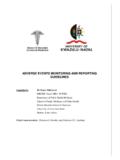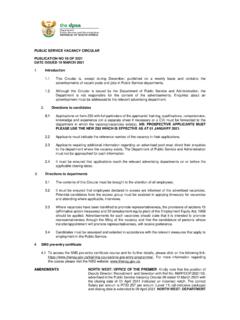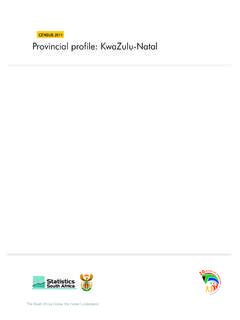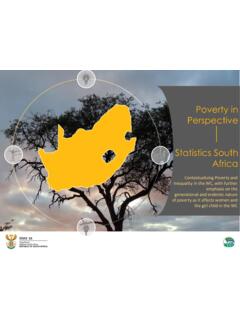Transcription of QUALITY MANAGEMENT SYSTEM (QMS) SCHOOL-BASED …
1 QUALITY MANAGEMENT SYSTEM (QMS) forSCHOOL-BASED EDUCATORSPRINCIPALS ASSOCIATION MEETINGDate: 21 February 2020 Venue: DBEC ontents Purpose Background What is QMS? Differences QMS & IQMS Contents of CA 2 of 2014 Key elements Performance Standards Principal appraisals Disagreements and Grievances Training and Capacity Building Financial Implications RecommendationsPurposeTo request the Principals Association meeting: to note ELRC Collective Agreement 02 of 2014 on the QUALITY MANAGEMENT SYSTEM (QMS) and its Addendum for SCHOOL-BASED educators; and to note and discuss the QMS MANAGEMENT Plan for 2020 and Collective Agreement 02 of 2014 on the QUALITY MANAGEMENT SYSTEM (QMS) for SCHOOL-BASED educators was approved by all parties at ELRC in November 2014.
2 The agreement was finalised by the ELRC on 03 September 2019. An addendum to the agreement outlining the timeframes for training, capacity building and implementation was signed by all parties on 10 September 2020. ELRC Collective Agreement 2 of 2014 LINK TO COLLECTIVE AGREEMENT 2 OF 2014 The QMS Collective Agreement and its Addendum are available on the ELRC website and can be downloaded through the links below:a) QMS Collective Agreement: ) QMS Addendum: is the QMS? The QMS, which was developed collaboratively in the ELRC by the department and teacher unions, is a streamlined performance MANAGEMENT SYSTEM designed to measure the performance of educators in line with their respective roles and responsibilities.
3 It has delinked the PGP which formed part of the IQMS framework. This avoids duplication as the professional development of educators is addressed through structures provided in the Integrated Strategic Framework for Teacher Education and Development (ISPFTED). The QMS introduces a work plan which must be completed and signed by Principals, Deputy Principals and Heads of Departments with their immediate supervisors. The Circuit Manager has a pivotal role in agreeing on a workplan with principals with clear annual targets for improvement. The work plan did not feature in the IQMS. Differences between QMS and IQMS Educator appraisals in the IQMS are conducted annually. The QMS introduces a mid-year educator appraisal followed by an annual appraisal.
4 The DSG was responsible for educator appraisal and development in the IQMS. The QMS strengthens the role of the SMT who are required to conduct the performance appraisals of educators, including classroom observations. The number of Performance standards for educators in each post level has been reduced and the criteria for each performance standard focus on the deliverables within a school . The process will now be driven by the principal and managed by the SMT, and not the elected PageAInformation Resource Pack 6 BQMS Appraisal Instruments (Post Level 1) 21 CQMS Work plan and Appraisal Instruments for PL 2 Educators (Heads of Departments) 32 DQMS Work plan and Appraisal Instruments for PL 3 (Deputy Principals) 46 EQMS Work plan and Appraisal Instruments for PL 4 (Principals)
5 65F Summative scores for school Lesson observation instrument 85 Contents of Collective AgreementPerformance StandardsPost Level 1 Creation of a positive learning environmentCurriculum knowledge, lesson planning and presentationLearner assessment and achievementProfessional conductExtra-mural and co-curricular participationPerformance Standards (PL 1)Performance StandardNo. of CriteriaNo. of descriptors1. Creation of a positive learning environment272. Curriculum knowledge, lesson planning and presentation4123. Learner assessment and achievement374. Professional conduct295. Extra-mural and co-curricular participation13 Total1238 Maximum Score = 152 ClassroomObservation: Performance Standards 1 -3 ELRC Collective Agreement Number 2 of 2014 (pages 29-33)Performance Standards: Departmental Head PL 2 POST LEVEL 2 Creation of a positive learning environmentCurriculum knowledge, lesson planning and presentationLearner assessment and achievementProfessional conductExtra-mural and co-curricular participationManagement of CurriculumPerformance Standards (PL 2)Performance StandardNo.
6 Of CriteriaNo. of descriptors1. Creation of a positive learning environment272. Curriculum knowledge, lesson planning and presentation4123. Learner assessment and achievement374. Professional conduct295. Extra-mural and co-curricular participation136. MANAGEMENT of the curriculum419 Total1657 Maximum Score = 228 ClassroomObservation: Performance Standards 1 -3 ELRC Collective Agreement Number 2 of 2014 (pages 41-46)Principal / Deputy PrincipalLeading the learning schoolShaping the direction and development of the schoolManaging QUALITY and securing accountabilityDeveloping and empowering self and othersManaging the school as an organizationManaging human resources (staff) in the schoolManagement and advocacy of extra-mural activitiesPerformance Standards (Deputy Principal)Performance StandardNo.
7 Of CriteriaNo. of descriptors1. Leading the learning school2132. Shaping the direction and development of the school263. Managing QUALITY and securing accountability254. Developing and empowering self and others245. Managing the school as an organization356. Managing human resources (staff) in the school127. MANAGEMENT and advocacy of extra-muralactivities12 Total1337 Maximum Score = 148 ClassroomObservation: Performance Standard 1 (Criterion 1)ELRC Collective Agreement Number 2 of 2014 (pages 56-65)Performance Standards (Principal)Performance StandardNo. of CriteriaNo. of descriptors1. Leading the learning school2152. Shaping the direction and development of the school2133. Managing QUALITY and securing accountability2114.
8 Developing and empowering self and others295. Managing the school as an organization3146. Managing human resources (staff) in the school157. MANAGEMENT and advocacy of extra-muralactivities14 Total1371 Maximum Score = 284 ClassroomObservation: Performance Standard 1 (Criterion 1)ELRC Collective Agreement Number 2 of 2014 (pages 75-85)Principal appraisals The appraisal instrument provides a weighting to differentiate the appraisal of principals according to their teaching load. The weighting applies to principals who teach 30% or more of the scheduled teaching time and those who teach for less than 30% of the scheduled teaching and GrievancesDisagreements and Grievances resolved at: school Level; Circuit Level; and ELRC dispute resolution and Capacity BuildingTechnical Task Team A QMS Technical Task Team was formed by the ELRC engaged in the development of training resources and planned for capacity building and implementation.
9 Training resources are in electronic form and will be placed on the DBE / Teacher Union websites. An Addendum to the Collective Agreement states that training and capacity building on the QMS across all PEDs will take in 2020 while full implementation in schools will occur in January 2021. A training strategy and roll-out MANAGEMENT plan has been developed. The key features of the training strategy are:oTraining in PEDs will be undertaken by a Provincial Training Team (PTT) using a set of resources developed at National level; andoAll school based educators will be trained from April 2020 to September 2020. The duration of each training session will be 4-5 PLANS NationalandProvincialTrainingTeams(NTT/P TT)comprisingdepartmentalofficialsaswell asteacherunionrepresentativeshavebeenest ablished.
10 CompositionofNTT(147): CompositionofPTT(1464): officialsCircuit ManagersLabour1 perDistrict (75)1 per Circuit (1014)5 per District (375)(3 SADTU + 2 ATU)ProvinceDistrictOfficialsLabour 3 per Head Office(27)1 per District (75)5 per Province (45)(3 SADTU + 2 ATU)TRAINING PLANS (cont.)Training of Educators by Provincial Training TeamProvinceNumber of schoolsNo. of EducatorsPTT: Total No. of FacilitatorsTotal number of training sessions made up of 50 educators per session (Total No. Educators 50)No. of Teams [ 3 Facilitators per team]No. of Training Sessions/ Days for 3 Trainers per teamEastern Cape5 23659 3242861 1869512 Free State1 15522 640814532717 Gauteng2 06869 1802631 3848816 kwazulu -Natal5 78890 2882751 8069220 Limpopo3 79451 6402011 0336715 Mpumalanga1 77333 681926743122 North West1 45526 128935233117 Northern Cape54510 227612052010 Western Cape1 44135 6811127143719 Total23 255398 7891 4647 976488148 TRAINING DATES The scheduled dates for training of the Core and National Training Team members who were nominated by PEDs are as follows:Team / ProvinceDatesCore Training Team (Lead Trainers)18-19 February 2020 National Training Team.



